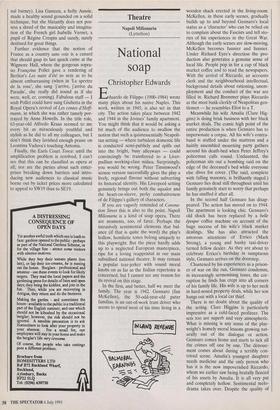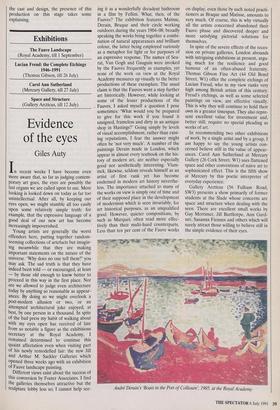Theatre
Napoli Milionaria (Lyttelton)
National soap
Christopher Edwards
Eduardo de Filippo (1900-1984) wrote many plays about his native Naples. This work, written in 1945, is also set in that city. The action takes place between 1942 and 1944 in the Jovines' family apartment. You might think that it would be asking a bit much of the audience to swallow the notion that such a quintessentially Neapoli- tan setting — where turbulent domestic life is conducted semi-publicly and spills out into the bright, busy alleyways — could convincingly be transferred to a Liver- pudlian working-class milieu. Surprisingly, you would be wrong. Peter Tinniswood's scouse version successfully gives the play a lively, regional flavour without subverting its historical identity. His Liverpool setting genuinely brings out both the squalor and the heart-on-sleeve, perky combativeness of de Filippo's gallery of characters.
If you are vaguely reminded of Corona- tion Street this is also to the point. Napoli Milionaria is a kind of soap opera. There are moments, too, of farce. Perhaps the intrusively sentimental elements that bal- ance (if that is quite the word) the play's hollow, homiletic tones belong uniquely to this playwright. But the piece hardly adds up to a neglected European masterpiece, ripe for a loving reappraisal in our main subsidised national theatre. It may remain a popular tear-jerker with sound moral knobs on as far as the Italian repertoire is concerned, but I cannot see any reason for its revival on this stage.
In the first, and better, half we meet the family. The year is 1942. Gennaro (Ian McKellen), the 50-odd-year-old pater familias, is an out-of-work tram driver who seems to spend most of his time living in a wooden shack erected in the living-room. McKellen, in these early scenes, gradually builds up to and beyond Gennaro's local status as a 'character' who can be relied on to complain about the Fascists and tell sto- ries of his experiences in the Great War. Although the early scenes are slow-moving, McKellen becomes funnier and funnier. Under Richard Eyre's direction the pro- duction also generates a genuine sense of local life. People pop in for a cup of black market coffee and to read the newspapers. With the arrival of Riccardo, an accounts clerk and the neighbourhood intellectual, background details about rationing, unem- ployment and the conduct of the war are filled in. Richard Bremmer plays Riccardo as the most bank-clerkly of Neapolitan gen- tlemen — he resembles Eliot to a T.
Meanwhile his wife Amalia (Clare Hig- gins) is doing brisk business with her black market deals. The comic high point of the entire production is when Gennaro has to impersonate a corpse. All his wife's contra- band is stuffed under the mattress and a haitily assembled mourning party gathers around his death-bed when Peter Jeffrey's policeman calls round. Undaunted, the policeman sits out a bombing raid on the edge of the deceased's bed while everyone else dives for cover. (The raid, complete with falling masonry, is brilliantly staged.) Gennaro lies dead still throughout until his family genuinely start to worry that perhaps he has snuffed it after all.
In the second half Gennaro has disap- peared. The action has moved on to 1944. The apartment is looking chic. Gennaro's old shack has been replaced by a belle époque coffee machine on account of the huge success of his wife's black market dealings. She has also attracted the amorous attentions of Errico (Mark Strong), a young and hunky taxi-driver turned fellow dealer. As they are about to celebrate Errico's birthday in sumptuous style, Gennaro arrives on the doorstep.
Chastened by his experiences as a prison- er of war on the run, Gennaro condemns, in increasingly sermonising tones, the cor- ruption he finds has crept into all corners of his family life. His wife is up to her neck in hard-nosed property deals, while her son hangs out with a local car thief.
There is no doubt about the quality of the acting. Clare Higgins is particularly impressive as a cold-faced profiteer. The sets too are superb and very atmospheric. What is missing is any sense of the play- wright's homely moral lessons growing nat- urally out of the dialogue or action. Gennaro comes home and starts to tick all the crimes off one by one. The dénoue- ment comes about during a terribly con- trived scene. Amalia's youngest daughter needs medicine and the only person who has it is the now impoverished Riccardo, whom we earlier saw being brutally fleeced of his assets by Amalia. It is all very pat and completely hollow. Sentimental melo- drama takes over. Despite the quality of the cast and design, the presence of this production on this stage takes some explaining.



















































 Previous page
Previous page